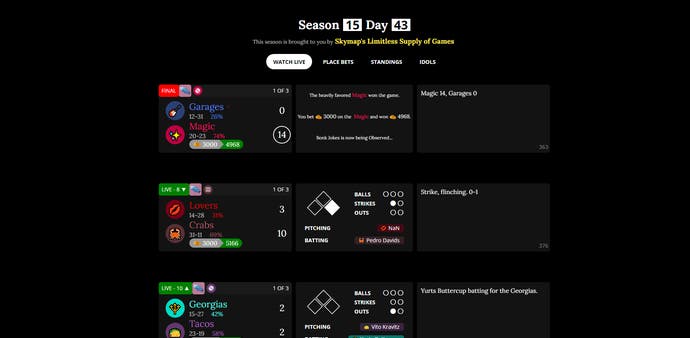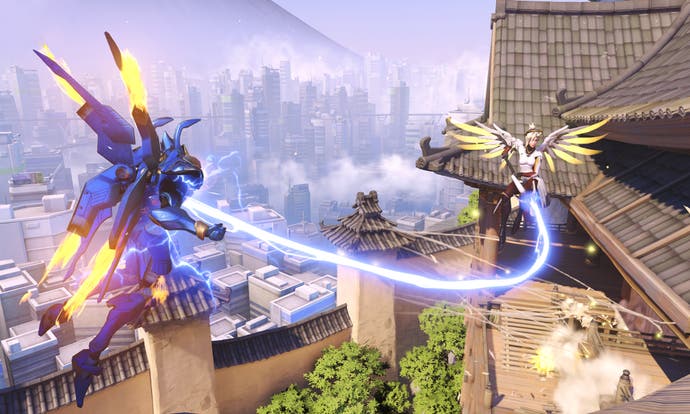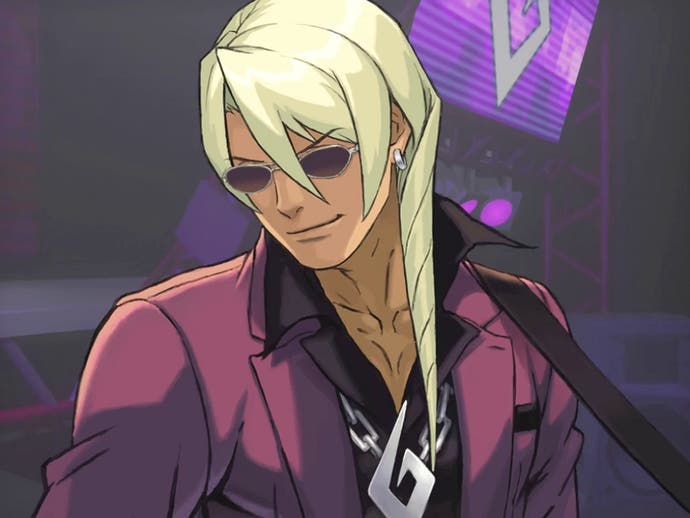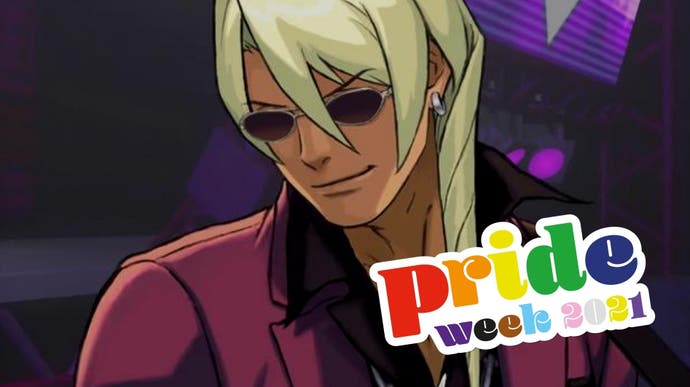Pride Week: Queer play is everywhere
Introducing a week of LGBT+ stories on Eurogamer.
Hello! All this week Eurogamer is celebrating Pride with a series of stories examining the confluence of LGBT+ communities and play in its many different forms, from video games and tabletop games through to live-action role-play. Kicking things off is Jay, who explores the joyously queer world of Blaseball and beyond.
Blaseball is pretty difficult to explain. On its surface it's a browser-based fantasy sports simulator. Players with randomly generated names like Zephyr McCloud and Justice Spoon bat and pitch their way through 100 games per week for teams like the Ohio Worms and the Hellmouth Sunbeams. And also along the way people get incinerated, or do sick skateboard tricks, or have run-ins with gods.
Blaseball is also pretty commonly regarded as a queer game. That might seem odd, at first, because none of the characters exist beyond lines of text describing their hits, strikes, or untimely deaths. But fans have become a buzzing, communal lore factory, turning the game into something much richer.
Any interpretation of a Blaseball character is considered valid, but no matter the individual preferences of any given fan, the overall climate is inclusive and celebratory of all genders and sexualities. And some lore is widely accepted enough to become near-standard, like the multi-gendered polycule that makes up the San Francisco Lovers, first suggested by nonbinary captain Knight Urlacher. Or the relationship between Breckenridge Jazz Hands pitcher Wyatt Pothos and former Toyko Lift hitter Wyatt Quitter. (The characters not having assigned genders obviously also means this relationship is open to interpretation, but Pothos is usually given she/her pronouns and Quitter they/them).

Don't be fooled by the lack of mechanical integration of this on the website - it's absolutely part of playing the game of Blaseball. You can play without getting involved in it, but it is encouraged and facilitated by the developers, who deliberately draw their teams and players with huge blank spaces for fans to enjoy filling in themselves. And a well-moderated Discord server adds the potential for community and collaboration.
Still, while The Game Band deserve every credit for their implementation, this kind of play is something that's happened for a very long time. Across media, fans have interpreted characters as queer and used that to spur their own creativity. But games especially often walk this line between giving enough characterisation to intrigue a fanbase while leaving enough room for those fans to play with their own creativity.
Take Overwatch. We might now call that a queer game since Blizzard have canonically made Tracer and Soldier: 76 gay. But it was also a queer game long before that, in the same way that Blaseball is. There's a reason that the most popular pairing is still archer Hanzo and cowboy McCree, despite any kind of confirmation from Blizzard in the game's seven years of canon. It never had to do with what was narratively included. It was its own way of playing within the universe of Overwatch.

Blizzard don't deserve credit for that like The Game Band do. Instead of putting encouragements and protections in place, they've continually capitalised on it reactively while continuing not to tackle homophobia and transphobia in their games and esports leagues. But it's still a part of the same phenomenon; one that creates a vibrant space on the margins of so many games.
In fact, there are few games that this doesn't happen with. Red Dead Redemption 2 has more than 3,200 queer fanfictions written about it on Archive of Our Own. League of Legends has 2,700. Call of Duty: 700.
Blizzard don't deserve credit for that like The Game Band do. Instead of putting encouragements and protections in place, they've continually capitalised on it reactively while continuing not to tackle homophobia and transphobia in their games and esports leagues.
And it's only getting more interesting, influenced by changes and growth in online queer culture at large. I've been in the Ace Attorney fandom for 15 years and there have always been a good number of popular same-gender relationships. They're not canon, but they are integral to this extended creative play within the fandom. But across that decade and a half, more diverse interpretations have been growing in popularity.

For example, there have been a whole lot more people interpreting characters as nonbinary. That's not to say that some people weren't reading the characters in that way before, but that the volume has certainly increased. On Archive of Our Own, the tag "nonbinary character" began to pick up work in 2018, and really took off in the past two years. And with more people doing it, there's more community that latches onto the idea, snowballing into a more exciting community, that produces more fic and art, and so on and so forth.
In a real way, these games that were released more than a decade ago have gotten queerer. Not through the stories themselves changing, but through the way that they are being played.
This sort of creativity may be a response to an unfortunate lack of varied characters in AAA games and wider major media, but it gives people the space to explore, create, and collaborate. It's a part of the experience for a subset of fans for almost any game you could imagine, and has been for a very long time, but it's never static. New fans inspired by an evolving cultural context are taking things to greater heights. And, increasingly, games like Blaseball are blurring the lines in order to incorporate it into their core play.









